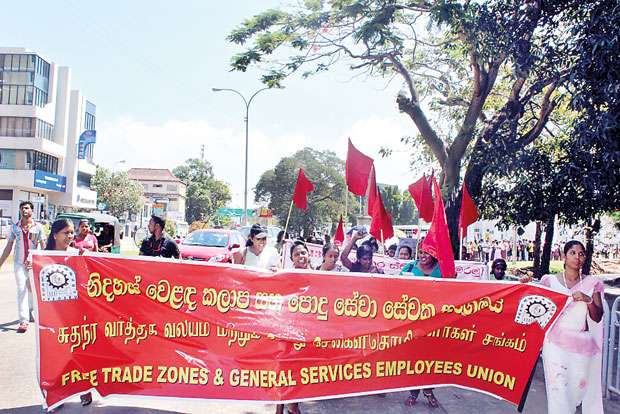Private or SOE?
Is private sector efficient and decent the way it is projected?

It is inefficiency, lack of competent managers and heavy politicisation
These ailments in the SOEs can be cured if this extremely corrupt and indecent political culture can be sanitised
That leaves unchecked and unregulated space for inhuman exploitation of cheap labour
 2018-06-29
2018-06-29“Having stabilized the economy of the country over the past couple of years, Sri Lanka’s key priority right now is attracting foreign direct investments (FDIs)”- Minister of Development Strategies and International Trade, Malik Samarawickrama at the Sri Lanka Investment and Business Conclave 2018.
The Committee on Public Accounts (CoPA) Report tabled in Parliament has startling revelations about State Owned Enterprises (SOE) that cost the country colossal sums of money.

On Monday, June 18, addressing a media workshop, Speaker Jayasuriya was reported as having said, the loss from SOEs was over Rs.50 billion.
Addressing the same workshop, Auditor General Gamini Wijesinghe was quoted as having said,
“Weeratunge (former Presidential Secretary) was sentenced to jail over misappropriation of public funds. If other public officials are also treated the same way, more than half of them would end up in jail”.
He had also said, the CB Bond Scam was not the only mega corruption in this country. From import of coal to import of rice, there had been many mega scams during the previous and the present regime.
One important fact that has to be noted here lest we forget is that all heavy corruption in the public sector has a filthy rich businessman behind them. In economic terms, it’s the private sector demand that the public sector meets in most, if not all corrupt deals.
Yet, corruption is not the highlighted reason for failure in SOE.
It is inefficiency, lack of competent managers and heavy politicisation. COPA says 26 Ministries don’t have a work plan and 29 have not updated their fixed asset balance sheets. Obviously, there is no clear path created for SOEs to run efficiently and at a profit under such governance. The Fiscal Report 2017 of the Ministry of Finance listed 19 SOEs that run at a loss and has to be funded annually by the taxpayer money. The report tables their total loss to be Rs.35.3 billion during the first 08 months of 2016.
Identified reasons for SOE failures in general are, the appointment of political lackeys to Governing Boards, who are most often not qualified to be in such boards, using them to provide employment for political advantage ignoring cadre estimates and also lack of required expertise and management.
These ailments in the SOEs can be cured if this extremely corrupt and indecent political culture can be sanitised.
Yet, the political insanity is not what is questioned, in finding answers.
What is instead proposed as the only remedy by Economists, Institutional Specialists, Strategic Planners and the like is privatising SOEs, and within this same insanely corrupt political culture that decides and governs the whole process of privatisation too.
The direct explanation in promoting “privatisation” is that the private sector is efficient and always runs on profit-that, the private investments provide the motivation to run the business at a profit.
But how true is that? Don’t private sector companies go bankrupt?
Over five years ago in January 2013, the then Minister of Labour Gamini Lokuge complained to President Rajapaksa that over 20 private investors have closed down their factories without any notice and have fled the country.
He told media that these company owners have not paid workers their due wages for many months, not paid EPF and ETF dues, not paid gratuity and have even defaulted loan payments in millions of rupees to local banks.
Many thousands have been thrown out of their jobs due to these crooked businesses suddenly putting up shutters.
They were all BOI-SL approved projects that promised to bring dollar investments and create permanent employment for Sri Lankans.
The situation in the private sector that enjoys plenty of incentives, is more chaotic than what then Labour Minister Gamini Lokuge said in 2013.
The Sunday Times (ST) on 2017 September 03 gave the number of factories closed as 721 during the period 2010 to 2016 and both years included, a figure they obtained on a RTI application made to the BOI-SL.
Of them, the ST news report revealed, 103 companies have been given BOI land as well, while all companies enjoyed tax concessions and duty waivers.
At an average, 103 companies have closed shop every year. A number of companies shut down in the year 2013 was 150 while the approved number had been 143, less than the number that closed down.
Further probing the issue, the ST reported that numbers provided by the BOI-SL and that given in the Auditor General’s Report differ.
It says:
“The Auditor General’s Report also contains statistics. But the number of projects approved and the number of projects cancelled, suspended or closed down are different – and higher than those the BOI provided to the ST under RTI”. Thus, the number of companies shut down could be at least a few dozens more than the 721 given by the BOI. To give a bigger number would leave a heavier blame on BOI and prove the failure of the private sector too.
What is also important here is that, this heavy failure in the most patronised sector in private business, is not just that they are given financial and monetary concessions, infrastructure and in some instances even free electricity, but are given the benefit of unofficially relaxing labour and industrial law and at times deciding in favour of investments against due justice for employees.
That leaves unchecked and unregulated space for inhuman exploitation of cheap labour. That provides the explanation why in all FTZs and Industrial Zones that total 14, and the whole country now turned under the BOI-SL having around 2,200 factories operating, there are only 04 companies that have Collective Agreements and none in the Apparel Sector that talks of “Clean Cloth”.
No major apparel manufacturer allows trade unions and there are not more than two dozen companies in the whole private sector under the BOI that have accepted trade unions as legal bargaining agents of workers.
What is instead proposed as the only remedy by Economists and the like is privatising SOEs, and within this same insanely corrupt political culture
That is, in a country that guarantees “right to association including trade unions” in its Constitution, abides by the UN Human Rights Charter, has signed and ratified ILO Conventions 87 and 93 and last year regained EU GSP “Plus” on condition it would guarantee human rights, labour rights and environmental safety.
In a discussion document titled “Degeneration of the judicial process - How it affects Labour Rights and Justice” shared by Free Trade Zone & General Services Employees’ Union (FTZ&GSEU) with Sri Lankan member unions of “IndustriAll Global Union”, it is said:
“Labour Tribunals chaired by a ‘President’ that were established with stress on conciliation for the convenience of workers have now been turned into traditional ‘Courts’ by their ‘Presidents’. Though without any legal provision and in violation of the whole concept of a “Tribunal”, they have now been restricted to the legal profession by these presidents. Thus they have also become more unduly advantageous to employers.”
This discussion document goes on to say:
“From policy makers and decision makers in the Labour Ministry and department to the high posts in the judiciary, the mindset is, all decisions taken should be in favour of investment and should not in any way deter incoming investors.…… Thus it is no easy task for workers to seek justice and fair play and have their rights established.”
It is with State decisions made in favour of investors and all such advantages piggybacking tax and duty waivers, concessions and infrastructure facilities, that over 721 businesses have gone bankrupt for seven years. Reasons for all those closures have not been workers. Not work stoppage. Quoting BOI Media and Publicity Director Samarasinghe on reasons for such closures the ST says:
“Many of the reasons for these closures are ‘internal’ to the companies, such as cash flow problems and market issues. In some cases, it is noncompliance with BOI agreement. For instance, not investing the amount they were expected to.”
Job losses from these closures are “generally not very significant” to Samarasinghe and perhaps to the BOI too. Yet his response also reveals that even the much-hyped apparel sector too have bankruptcies and throw out workers.
“In the apparel sector or other areas of manufacturing, there are possibilities of re-hiring” he has told the ST.
We have for the last 40 years, except in a very few instances, provided heavy incentives and concessions to FDIs that suddenly put up shutters and flee the country.
Once discussing this issue, Anton Marcus, Joint Secretary of FTZ&GSEU told me, these investors don’t bring any money into the country. They collaborate with local businessmen, who facilitate local bank loans and when they flee the country shutting down factories, they leave huge unpaid debts behind.
The fact is BOI continues to approve such projects as established investors like Motorola, that President Jayewardene said was waiting to come and the Volkswagen assembly plant PM Wickremesinghe promised, never come, added Anton Marcus. The unanswered question, therefore, is, “How dependable, how efficient and how decent is the private sector that is being promoted against SOEs?”
Far more important is the question, can this free market economy provide for any better private investor and how capable is this yahapalanaya to put things right?
“Pardon my French, but they have done bugger all and it is a Right Royal ….” Prof. Razeen Sally said, adding, “….it (government) has done hardly anything to uplift the economy since coming to power in 2015.” –speaking at SLFI 10 days ago on ‘Capitalism in Asia: What it means for Sri Lanka’, organised by Advocata.
